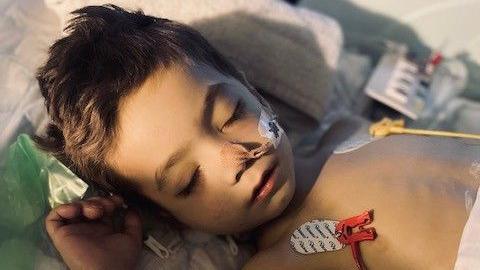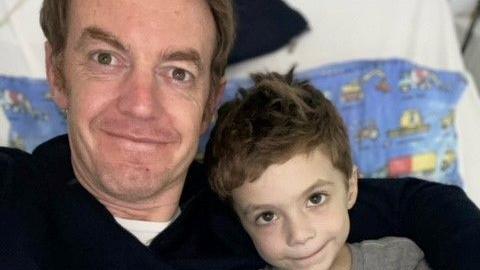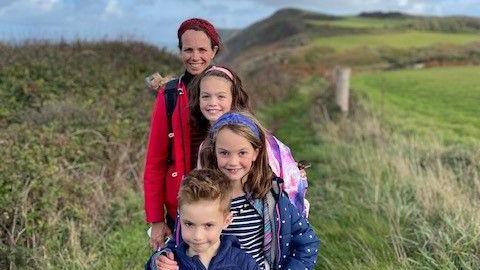Mother takes son to US for life saving treatment

George was in the final stages of liver disease before his transplant
At a glance
Catherine took her son George to the United States to receive a new treatment for Langerhans’ cell histiocytosis (LCH)
He responded well but had severe liver disease, so she donated part of her liver as a transplant
George's family is hoping the treatment, trametinib, will become more widely available on the NHS
- Published
A mother from Sevenoaks took her son abroad to receive lifesaving new treatment then donated part of her liver as a transplant.
Catherine's seven-year-old son George has Langerhans’ cell histiocytosis (LCH), a cancer-like condition the family was told could only be treated with chemotherapy.
The treatment severely damaged George's liver and did not stop the disease from returning, so Catherine took her son to the United States to see an oncologist who used a different approach.
She said George now had "boundless energy" and was "very excited for life".
Catherine is hoping that George's success with the new treatment, known as trametinib, may increase its availability on the NHS.
LCH is a rare condition that affects about 50 children in the UK each year.
Cells that normally protect the skin move to other organs, in George's case his liver, bone and spleen.
Catherine said her son's initial diagnosis was "terrifying".
At the age of about 18 months, George developed a skin rash and by his second birthday, was frequently tired with bad tummy pain.
After several tests, he was diagnosed with LCH and given 12 months of chemotherapy.

George, pictured with his father Sam, had severe liver damage from chemotherapy
However, the disease returned five days after finishing the treatment and doctors said George would need more rounds, which would further damage his liver.
Catherine contacted Dr Ashish Kumar at Cincinnati Children's Hospital, which "changed everything", she said.
Dr Kumar uses a drug called trametinib, which treats the LCH without damaging organs.
He has been treating patients with the drug for about seven years and said it worked "much better than our expectations and had literally saved many children's lives".
Dr Kumar said trametinib was not yet widely used because doctors were reluctant to try new treatments until they had been thoroughly tested, which was difficult to do with rare diseases like LCH.

Catherine said George's seventh birthday was special as the family could "celebrate having him here"
George responded well to Dr Kumar's treatment but his liver had already been so severely damaged that he needed a transplant.
He was severely jaundiced with a distended belly.
"That's when I stepped in," said Catherine.
Catherine donated 25% of her liver to George and within a few weeks of the transplant he was running up and down the ward.
"He hasn't really stopped moving since," Catherine said.
Follow BBC South East on Facebook, external, on X, external, and on Instagram, external. Send your story ideas to southeasttoday@bbc.co.uk, external.